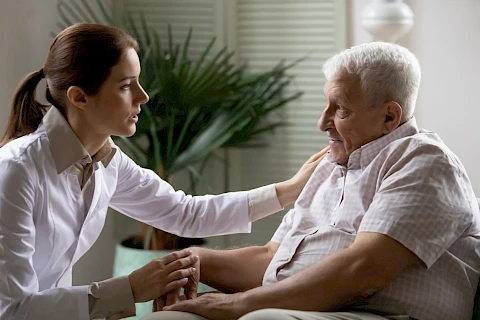
Learning that a parent has been diagnosed with Alzheimer's disease is a life-changing moment. September is World Alzheimer's Month, a time to raise awareness and support for those affected. If you are taking care of a senior loved one who has just been diagnosed, this guide will help you handle the initial shock and prepare for the future.
Alzheimer's: An Overview
Alzheimer's is a brain disorder that affects memory, thinking, and behavior. It has different stages, each with its own set of symptoms. In the early stages, your loved one may experience mild memory loss and confusion. As the disease progresses, symptoms can include severe memory impairment, difficulty in communicating, and behavioral changes. Understanding these symptoms helps you know what to expect and prepares you for the emotional toll it can take on your family.
Immediate Steps to Take
Early intervention and planning are critical for managing the disease. Upon receiving the diagnosis, consult healthcare professionals immediately. Schedule appointments with specialists who can provide comprehensive medical evaluations. Gather all medical records, including past health history, to help doctors make informed decisions. It's equally important to discuss the diagnosis with family members. Open communication ensures everyone is on the same page and can contribute to your loved one's care plan.
Planning for Care
Begin by assessing the level of care your loved one will require. Care options may include in-home care, assisted living facilities, or nursing homes, each offering different levels of support depending on your loved one’s needs. Each option has its benefits, so choose what best suits your needs. Financial planning is essential. Check their insurance policies and explore benefits that could help cover healthcare costs. Being financially prepared will ease future burdens.
Educating Yourself and Your Family
Knowledge is power. Take the time to educate yourself and your family about Alzheimer's disease. Articles from the Alzheimer's Association and medical journals offer excellent insights. Support groups and counseling can give emotional support and practical advice. Staying informed about the disease's progression ensures you're prepared for each stage.
Creating a Safe and Supportive Environment
Modify your home for safety. Remove tripping hazards and install locks on cabinets with dangerous items. Establish a daily routine to provide your loved one with structure and predictability. Engage them in meaningful activities that stimulate their mind and keep them active. Be prepared to manage behavioral changes, like agitation or wandering. Consult professionals if these become challenging.
Taking Care of Yourself
Being a caregiver can be exhausting. Recognize signs of stress and burnout. Make self-care a priority; take breaks and pursue hobbies that relax you. Don't hesitate to seek support from friends, family, or professional caregivers. Balancing your personal life with caregiving duties will make you a more effective and happier caregiver.
We Specialize in Memory Care
Dealing with a parent's Alzheimer's diagnosis is difficult, but early planning and education can ease the journey. Professional help is always available. If you need assistance, including full respite care services, reach out to us at Senior Helpers Westchester. We proudly serve Mount Vernon, New Rochelle, Tarrytown, Bronxville, and the greater Westchester County. You're not alone in this journey—let's navigate it together.